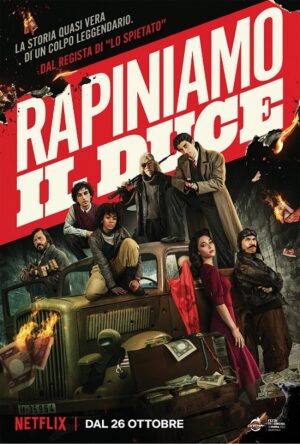“Rapiniamo il Duce”, fact and fiction
TORONTO – Renato De Maria’s film is many things, a comedy, a heist, a romance, one that draws inspiration from various works, past and present while leaving nothing off the table in the effort to entertain. From the opening credits, a familiar percussive beat: the Rolling Stones’ “Paint it Black” covered in Italian by actress Matilda De Angelis, the film’s Femme Fatale. She glides onto the stage in a classy Cabaret Bar, a young singing starlet named Yvonne. Her long bouncy curls, coiffed in sleek waves has a touch of Rita Hayworth’s Gilda, minus the trademark hair flips. De Angelis actually sings the cover, with a mix of sultry and sombre, a foretelling of the character’s predicament.
De Angelis is of course already one of Italy’s rising stars, but it’s with performances like this that show her range.
From the opening scene a tone is set: “Rapiniamo Il Duce” is a fast-paced comic book inspired adventure with a semi-historical backdrop – or as the opening title card reads “This Story is true-ish”.
The plot involves a ragtag group of thieves lead by Isola (Piero Castellitto), a wartime “entrepreneur” from Milano. They discover that Mussolini’s legendary treasure – mostly pearls and gold items confiscated from Italian citizens – is being transported to Switzerland. When one of Isola’s men intercepts the details from a military cipher, the heist is set.
A driver, a pickpocket, a sniper, a bomb specialist and a communications expert hatch a scheme to break into the infamous Black Zone, a military barracks in Milano. Their success, however, hinges on the guiles of the film’s standout characters, the young Yvonne and an aging Nora – the cuckquean of a Military General. As Nora, veteran actress Isabella Ferrari unquestionably channels the famed Norma Desmond character from Billy Wilder’s iconic 1950 film “Sunset Boulevard”.
In the classic film, Desmond (a silent film Star) seeks to remain relevant despite an industry that’s moved on. The parallels are obvious, but more importantly in “Rapiniamo Il Duce”, Nora symbolizes the perils of decadence and the karmic consequences of an evil Empire.
De Maria’s film has drawn some comparison to Tarantino’s “Inglorious Basterds” (2009) for its irreverent, popcorn-movie approach to period filmmaking. It’s not as layered as Quentin’s work, but it entertains nonetheless. “Rapiniamo Il Duce” is a fun watch with some great action sequences, beautiful images and some notable performances.
A forewarning however to history buffs: the film’s historicity is intentionally skewed. Take for example the character singing a 1966 Stones song on a 1945 stage. When asked if cinema has the responsibility to tell the story but also to be a warning for the future, De Maria asserted, “I believe that the objective of a film is to be a complete work that has depth and that has centered on the languages that I wanted to use and centered the narrative objectives…then there are certainly also things in it that can say something about life”.
Where to watch “Rapiniamo Il Duce”: Netiflix
Massimo Volpe is a filmmaker and freelance writer from Toronto: he writes reviews of Italian films/content on Netflix





